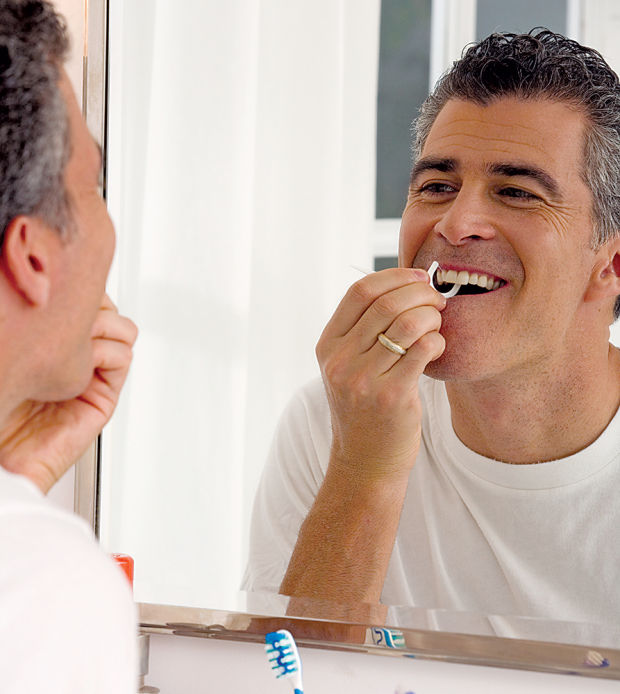Good oral health, regardless of age, is integral to overall good health.
This important component of heath is often an overlooked aspect of a baby boomer’s general health. Good oral health, including regular dental care, must be a lifetime commitment. Unfortunately, for many adults, oral health care is a luxury.
Daily oral hygiene (brushing, flossing and denture care), access to oral health services and oral health education are all key factors that can improve the oral health of the baby boomer generation.
Too many older adults suffer from long-term oral pain and periodontal disease, severely limiting regular activities and maybe even impeding their independence. And it is commonplace to ignore dental symptoms, putting off making a dental appointment until it becomes an emergency. Others are unaware of long-term health consequences. A survey commissioned by the Academy of General Dentistry, demonstrated that 63 percent of boomers – people born from 1946 to 1964 – with an oral symptom considered to be a key indicator of a more serious health condition were unaware of the symptom’s link to the condition. Severe gum disease, for example, can exacerbate serious and complicated overall health problems that increase with age, such as diabetes, heart disease, stroke and respiratory disease.
Whether caring for natural teeth or dentures, daily oral hygiene can mean adults of all ages will be free of oral pain, can maintain a well-balanced diet and can have a positive self-image. Without practicing good oral health, advancing age may put adults at risk for a number of oral health problems, including:
- Dry mouth (often a side effect of medications).
- Diminished sense of taste (also a side effect of some medications).
- Root decay (which can worsen with heavy brushing technique).
- Gingivitis and periodontal disease, sometimes known as gum disease.
- Uneven jawbone caused by tooth loss.
- Denture-induced tissue inflammation.
- Overgrowth of fungus in the mouth, known as thrush.
- Attrition (loss of teeth structure by mechanical forces).
- Oral cancer (early detection is key to increasing the survival rate for these cancers).
- Best practices in oral hygiene through our boomer years can preserve our smile and maintain a healthy active lifestyle throughout our senior years.
According to the Centers for Disease Control and Prevention, one-fourth of people age 65 and older have no remaining teeth. Nearly one-third of older adults have untreated tooth decay. Poor oral health – either from neglect or lack of access – may result in the deterioration of overall physical health.
Oral health problems make it more difficult for adults to consume a healthy diet. Oral health-related physical factors directly affecting nutrition include changes in chewing ability, dry mouth, untreated tooth decay, loose or missing teeth, dentures or implants, and ill-fitting bridges or dentures. Regular oral health care can improve and prevent oral health problems.
Good oral hygiene, choosing a healthy lifestyle and getting regular dental checkups – for most adults, this means at least once a year – are all important steps to a healthy mouth.
While it can be difficult for some people to access medical care, it can be even more difficult to access the oral health care system. Barriers to accessing affordable oral health care include:
- Busy lifestyle.
- Cost of oral health care.
- Limited or lack of dental coverage in work-site benefit plan.
- Oral health programs that offer affordable services.
- Limited dental insurance for retirees (not included in Medicare).
- iving on a fixed income.
- Mobility/transportation limitations.
- Many boomers are caring for their parents or older friends and relatives. Accessing dental care can be especially difficult for nursing home residents. Surveys have shown that nursing home residents with teeth suffer particularly from untreated tooth decay, while those without teeth also have a variety of oral health problems. This lack of access to oral health care is compounded by a shortage of skilled geriatric dental care professionals.
Resources are available to help overcome barriers to accessing affordable oral health care.
Community health centers care for people even if they have no dental health insurance, and can provide preventive and basic dental care. There are also a number of local dentists willing to treat Medicaid patients.
Other options to help overcome barriers include contacting the state or local chapter of the American Dental Association and reading “Finding Low-Cost Dental Care,” a resource from the National Institute of Dental and Craniofacial Research.
Even with regular checkups and good habits, dental problems can still occur. If you notice anything out of the ordinary with your teeth, gums or tongue, make an appointment with your dentist as soon as possible. It is important not to ignore such problems. Don’t wait for your next scheduled appointment. Pick up the phone and talk with your dental provider. Issues are easier to treat the sooner they are caught, and unnecessary discomfort can be avoided.
Don’t put your dental health on the back burner. It’s not too late to start taking care of that smile and increase your chances of improved overall health to enjoy life to the fullest.
Source:


No comments:
Post a Comment